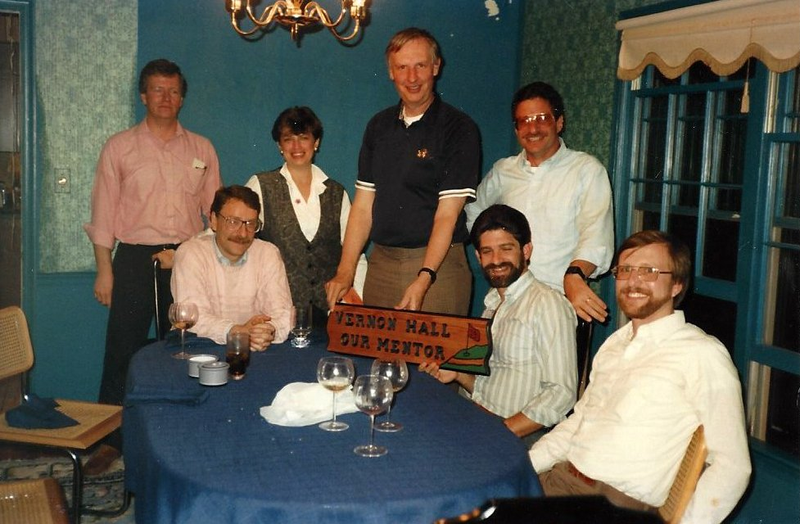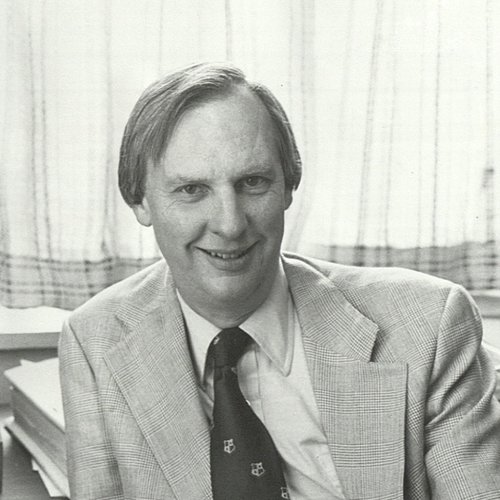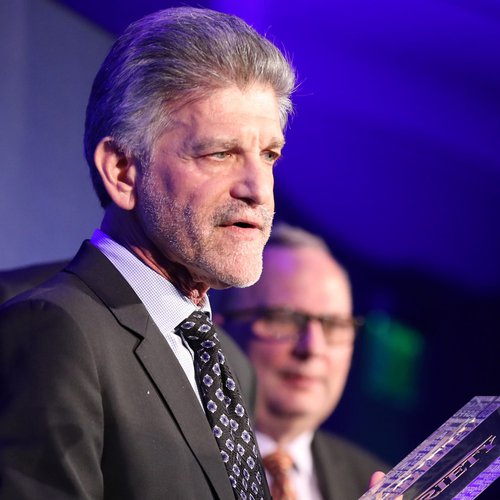Expanding Opportunities for Psychology Undergraduates
Psychology alumnus Danny Kaye M.A. ’76, Ph.D. ’77 establishes a scholarship fund to honor Professor Emeritus Vernon Hall and his commitment to undergraduate and graduate students at Syracuse.

1986 photo of psychology Professor Emeritus Vernon Hall (standing, center) and his students. Danny Kaye (seated, second from right, holding sign) has established a scholarship in Hall’s honor which will support undergraduate psychology students. Also pictured, from left to right, are Scott Brown, Alan Kraut, Jane Steinberg, Marc Baron and George Rebok.
To maximize their college experience, it’s important for students to work hard, seize opportunities and engage with mentors who instill creativity and encourage them to pursue their interests. For more than 30 years, Vernon “Vern” Hall, professor emeritus of psychology, fostered meaningful research and learning opportunities for undergraduate and graduate students at Syracuse University.
Among them was Danny Kaye M.A. ’76, Ph.D. ’77, who worked alongside Hall in the late 1970s. Now, Kaye is honoring Vern by establishing the Professor Vernon C. Hall Endowed Psychology Scholarship. This fund will support undergraduates majoring in psychology in the College of Arts and Sciences through Syracuse University’s Forever Orange campaign. Through this new scholarship, Kaye wants to pass along the spirit of Vernon Hall’s guidance and mentoring to today’s students to set them up for success in whatever field they pursue.
A Leader in Psychology
Before starting at Syracuse, Hall received a bachelor’s degree in history education at the University of Nebraska, served in the U.S. Navy and worked as a teacher at York High School in Nebraska. He then attended The Ohio State University, where he earned a master’s degree in counseling psychology and a Ph.D. in developmental and educational psychology. He worked as an assistant professor at the University of Nebraska and SUNY Buffalo before coming to Syracuse University’s College of Arts and Sciences (A&S) in 1966, where he taught for over 30 years before retiring in 1999.

Hall says he was drawn to the job at Syracuse because of the psychology department’s strong reputation and robust graduate program. He focused his research on cognitive and social development with an emphasis on the impact of environmental factors in schools. Author of nearly 50 scholarly publications, his work has appeared in leading journals including Contemporary Psychology, the Journal of Educational Psychology and Child Development. His accomplished record of teaching, departmental leadership and service to the University have made a lasting impact on the success of SU and the student experience.
Vernon Hall Service Snapshot:
University leadership appointments:
- Director of the Educational Psychology Graduate Training Program (1973-95)
- Chair of Undergraduate Advising for Psychology (1975-80)
- Department Chair of Psychology (1981-96)
University committee involvement:
- Psychology’s Graduate Admissions Committee (1975-80)
- University Senate Committee on Research and Equipment (1977-79)
- A&S Dean’s Search Committee (1985)
- University’s Senate Committee on Admissions (1991-92)
Professional organizations:
- Sigma Xi (Scientific Research Honor Society)
- American Psychological Association (Fellow)
- American Psychological Society (Fellow)
- American Education Research Association
- Northeastern Educational Research Association
- Society for Research in Child Development
During his time at SU, Hall was a proponent of experiential learning and would encourage his students to pursue research opportunities in local schools to help them bridge the gap between theoretical knowledge and real-world application.
“As a way of giving back to public schools that supported my research, I developed a program that gave experience credit to students for working with underprivileged elementary school pupils in Syracuse,” says Hall.
Among the many students whose community-engaged research he sponsored were well-known basketball players Roosevelt Bouie and the late Louis Orr. Hall also mentored more than a dozen Ph.D. students, many of whom later achieved success in psychology and various other industries, with one of them being Danny Kaye.
A Career-Altering Decision
After earning a bachelor’s degree in psychology from Cornell University, Kaye weighed his options between medical school and pursuing an advanced degree in psychology. He would ultimately choose the latter, and lucky for Kaye, Hall had just received a grant which included funding for a graduate assistant.
“From a list of applicants, Danny was the most qualified and I offered him the assistantship,” says Hall. “This began a lifelong professional and personal relationship.”
Kaye was honored to accept a position to work alongside Hall, whose specializations in child psychology and education aligned with his own. Hall would serve as Kaye’s thesis advisor, and the two would go on to co-author several research publications, one of which Kaye says was a crowning moment of his career.
“The whole time I was at Syracuse, Vern and I worked on this well-received paper. It was a four-year study of intellectual development looking at race and socioeconomic status, intending to refute some of the more heretical research that was being done at the time,” Kaye recalls. “It resulted in a really strong publication, which was one of the highlights of my entire career as of today.”
After graduating from Syracuse in 1977, Kaye remained at the University for two years as an acting assistant professor before taking a postdoctoral research position at Yale and then moving out west to teach at UCLA. But it was during his time on the faculty at Syracuse where he tapped into a new technology that would alter his career trajectory.
“I was the first faculty member at Syracuse to ask for and receive a microcomputer in 1977,” says Kaye. “We're not talking Apple or Microsoft yet; these were companies like Kaypro and North Star. These were the first microcomputers and they were boxes like a stereo receiver. I ended up doing a lot of research using microcomputers, studying things like reaction time, perception and memory.”
The Freedom to Flourish
Kaye’s career exemplifies the versatility of a psychology degree and a liberal arts education. His interest in applied research and technology would eventually prompt him to switch gears professionally and shift from education to the business sector.
In the late 1990s, after stints at Mattel Toys, Applause and Universal Studios, he accepted a position with 20th Century Fox. He notably co-founded the Fox Innovation Lab, which was 20th Century Fox’s research and development center established to drive the advancement of groundbreaking technology and new consumer experiences.
Kaye says his career successes stem from the creativity instilled in him at Syracuse working with Hall.
“That's one of the reasons I’m establishing this fund in Vern’s name because it was a great opportunity he gave me,” Kaye says. “While I was at Syracuse, Vern allowed me to pursue whatever I wanted research-wise, and that idea of allowing others to flourish creatively stuck with me forever.”

Tracing it Back to the Beginning
While Kaye’s path from education to entertainment is unquestionably unique, he says what made it possible was his experience at Syracuse—and with his mentor.
“Everything that I did in my career I traced back to my time with Vern and the opportunities that Syracuse and Vern afforded me,” says Kaye. “It gave me a broad set of skills and interests that I was able to apply later on.”
Scott Brown, another one of Hall’s students who graduated from Syracuse in 1980 and is now a distinguished professor emeritus of educational psychology at the University of Connecticut, echoes that sentiment.
“The training and mentoring I received from Vern had a powerful and long-lasting impact on me, both personally and professionally,” says Brown. “I owe much of my own career to what Vernon taught me during my graduate studies, and I have passed along his wisdom to my own students.”
After graduating from Syracuse, Jane Steinberg, another student of Hall’s, held many leadership roles with the National Institutes of Health and retired as the director of extramural activities at the National Institute of Mental Health in 2015. She says it was all made possible thanks to Hall’s mentorship.
"Vern rescued me from my dreary master’s work and introduced me to exploring real-world problems,” Steinberg says. “He spent hours poring over my coffee-stained printouts and rethinking approaches with intensity and humor. His generosity in mentoring guided me through graduate school and my career, for which I am terrifically grateful."
With this new scholarship, Kaye aims to honor Hall's enduring legacy of supporting undergraduate psychology students at Syracuse.
“I strove to introduce undergraduate students to research when I was a professor, following Vern’s lead at Syracuse,” says Kaye. “Not everybody does that because you're often full up with graduate students and postdocs, but you don't become a graduate student unless you're interested as an undergraduate, so that's the place to start.”
The scholarship fund isn’t the only way Kaye gives back to Syracuse. He also enjoys staying engaged with current psychology students by giving virtual talks and offering career advice.
“What I try to impress upon them is, based on my experiences, you just never know the kinds of routes your life can take,” he says. “This scholarship might allow a student that otherwise wouldn't have the luxury of pursuing unique avenues of research to have a meaningful opportunity like I had, and I don’t think there’s a better way to honor Vern.”
Still Strong
Hall and Kaye’s bond that started at Syracuse nearly 50 years ago remains strong today. After retiring from teaching and moving to North Carolina and then Maryland, Hall has remained in close contact with Kaye. They often reminisce about their days at Syracuse, where they coached a little league baseball team to a championship together. Their shared interest in baseball also leads to spirited discussions about whose team is better: Hall’s Baltimore Orioles or Kaye’s New York Yankees. But no matter which team is atop the standings, nothing can break their lifelong professional and personal relationship.
“It was truly fulfilling to work with graduate students like Danny and see them have outstanding careers,” says Hall. “It is a great honor to have a scholarship named after me which will support psychology students as they carve their own paths to success.”
To give to this fund, visit the Professor Vernon C. Hall Endowed Psychology Scholarship page.
About Forever Orange
Orange isn’t just our color. It’s our promise to leave the world better than we found it. Forever Orange: The Campaign for Syracuse University is poised to do just that. Fueled by 150 years of fearless firsts, together we can enhance academic excellence, transform the student experience and expand unique opportunities for learning and growth. Forever Orange endeavors to raise $1.5 billion in philanthropic support, inspire 125,000 individual donors to participate in the campaign, and actively engage one in five alumni in the life of the University. Now is the time to show the world what Orange can do. Visit syracuse.edu/foreverorange to learn more.
